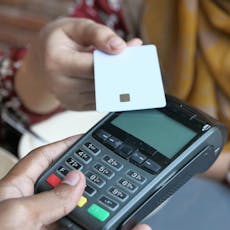0% interest cards can be used as a way to spread the cost of purchases without having to pay interest over a fixed period.
See which credit cards you're eligible for
Comparing won’t affect your credit score



By Matt Fernell, Editor at Finance.co.uk.

0% purchase cards allow you to buy things interest-free for an introductory period of time. Use our guide to learn how they work and how to get the best interest-free credit cards for you.
By using our eligibility checker, you’ll only ever see 0% purchase credit cards you’re likely to get.
Get a decision and see deals in minutes
Compare credit cards from a range of top providers
Only see credit cards you’re eligible for
Check eligibility with no impact on your credit score
We check your eligibility with no impact on your credit record so you can apply with confidence.
So we can check your eligibility and help you find the best 0% credit card available to you, we need to understand:
Your income, including your employment status, start date and annual income
Your household details, including your homeowner status, your share of rent or mortgage payments and your address
Your personal information, including your name, date of birth, number of dependents and contact details
We use this information to perform a ‘soft check’ on your credit record. This enables us to check your eligibility and show you the cards you have the best chance of getting.
When you see a list of the cards you’re eligible for, there are a few things you need to look at to work out which is right for you:
The interest-free period: This is how long you have before you will be charged interest on your credit card balance, which is currently up to 21 months. The longer the interest-free period, the longer you’ll have to pay off what you spend.
The revert-to interest rate: When the interest-free period is over, you will be charged interest on any balance you haven’t paid off. If you don’t think you’ll have cleared your credit card by this time, look for a card with a low interest rate.
Additional fees: Some cards come with fees for things like going over your credit limit, making a late payment charge or withdrawing cash from an ATM. Check the fees when comparing deals and ensure you're happy with them before applying.
Credit limit: This is how much you can spend on the card, so make sure you choose a card that lets you borrow enough to cover the purchases you want to make.
0% APR credit cards are usually used to help you make a purchase and spread the cost over the interest-free introductory period. Here’s everything you need to know about how 0% credit cards work.
You can use a 0% card to make any purchase you like, including things like:
A family holiday
A new car
White goods, like a washing machine or fridge
Electronics, like a new TV
They can also be a good option if you need to make lots of purchases in a short period of time. For example, when you're moving house and need to buy new furniture.
You can also use 0% credit cards to earn interest on the money you have.
For example, if you're booking flights for a trip that's not for another 12 months and have the money upfront to cover the cost, you could use a 0% purchase card to pay for them and put the money in a savings account.
This means you’ll be earning interest on the money in your savings account rather than sitting in the airline's account. Once the 0% period ends, use the funds from your savings to pay off the card so you don't get charged interest.
You will need a good credit rating to get a no-interest credit card. To access the best deals with the longest interest-free periods, you will need to have an excellent credit score.
To be eligible for a credit card, you will also need to:
Be a permanent UK resident
Be over 18 years old or over 21 with some providers
Have a steady income to show you can pay back what you spend
Use our eligibility checker, which will do a soft search of your credit report, to make sure you only apply for cards you're eligible for.
Getting pre-approval for a credit card before you officially apply is a worthwhile thing to do. If you apply for a credit card and get rejected, it can harm your credit report.
Applying for a card after using an eligibility checker doesn’t guarantee you’ll be accepted. Although it shows you the cards you’re more likely to be accepted for, you could still be rejected after a hard check on your report.
There are several options worth considering if interest-free or low-APR credit cards aren't right for you.
If you’re not eligible for an interest-free credit card because your current credit rating isn't good enough, you could consider a credit building card.
These cards are intended to be used by those with a below-average credit rating or no prior credit history. When you use these cards well and make your repayments on time, they can help you build your credit history, making you more likely to be eligible for credit cards that offer rewards and incentives.
These cards usually have a high APR and lower credit limits, but these restrictions could change as your credit history improves. Find out more about using a credit card to build your credit here.
If you have a good credit history and want a credit card that saves money and helps you earn some, it may be worth considering a cashback credit card.
When you spend with these cards, you'll receive a percentage of each transaction. These cards are a great way to reduce the cost of large purchases, especially if you have to make several at once. Here's an in-depth look at how cashback credit cards work.
If you want to make a large purchase, you could use a personal loan rather than a credit card. An unsecured loan allows you to borrow between £1,000 and £25,000, so it could be a better option if you need to make an expensive purchase.
Loans come with a set interest rate that will be charged on your repayments, so there is no way of borrowing interest-free. However, you will receive the money in your bank account, meaning a loan can be much more flexible than a purchase credit card. Here's more about how personal loans work.
The information provided does not constitute financial advice, it’s always important to do your own research to ensure a financial product is right for your circumstances. If you’re unsure you should contact an independent financial advisor.
We're on a mission to improve the finances of the nation by helping you to spend wisely and save money


We're on a mission to improve the finances of the nation by helping you to spend wisely and save money


If your credit rating is above average, you're more likely to be eligible for a 0% purchase credit card. You don't need a perfect credit history to be approved for these cards; however, the poorer your credit rating, the lower the credit limits and shorter interest-free periods you may be offered.
If your credit rating is below average, you may not be eligible for a 0% purchase credit card. If this is the case, you may need to improve your credit history.
In most cases, 0% offers are for a set period and can't be extended when it's about to expire.
You can transfer your balance from an expiring 0% credit card onto a new one using a balance transfer credit card to extend the benefits and avoid paying interest, but you’ll likely pay a fee.
Credit card companies have 0% credit card deals as an introductory offer to entice new customers. Eventually, the 0% period will end, meaning you'll start paying interest on your outstanding balance, which is how card issuers make money.
Credit reference agencies don't consider the interest rate of your credit cards when calculating your credit score.
Instead, lenders and credit providers are more interested in how you've managed your card. If you repay what you borrow on time and make regular monthly repayments, it can help improve your credit rating.
As you're not building interest, it can make how much you need to repay less expensive, potentially making it easier for you to repay.
The annual percentage rate (APR) is a percentage that shows you what you need to pay each year when borrowing money. This percentage includes the interest rate and any standard fees you'll have to pay.